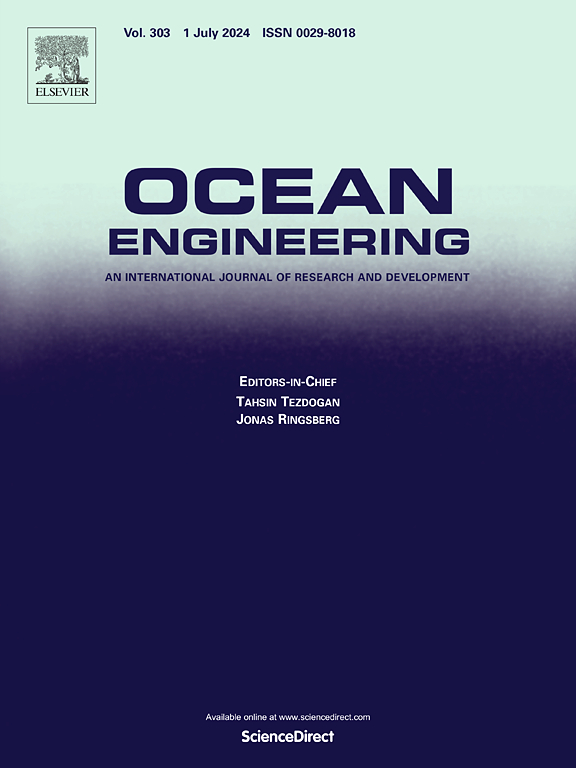Bio-inspired profile improving the flow near the stern of an underwater vehicle
IF 4.6
2区 工程技术
Q1 ENGINEERING, CIVIL
引用次数: 0
Abstract
The utilization of underwater vehicles is becoming increasingly prevalent in a number of fields, including marine resource exploration, exploitation, and oceanographic research. The wake induced by the motion of these vehicles has the potential to significantly affect the efficiency of the vehicles. This paper draws inspiration from the sperm whale profile and investigates a bio-inspired underwater vehicle, BioUV. The bio-inspired underwater vehicle incorporates an integrated sail as an alternative to the classical sail. The flow uniformity in the stern region is assessed using the integral non-uniformity coefficient. The differences in turbulent kinetic energy in the stern region are discussed, and the effects of hull profiles on flow uniformity and turbulent kinetic energy are further investigated. Furthermore, the resistance is evaluated based on wall pressure and wall shear stress. The results reveal that, without increasing the resistance of the bio-inspired underwater vehicle, BioUV without a parallel middle body can effectively mitigate the strong adverse pressure gradient at the stern () caused by the classical hull profile, reduce flow non-uniformity () and turbulent kinetic energy () in the stern region.
改善水下航行器尾部附近水流的生物启发轮廓
在海洋资源勘探、开发和海洋学研究等多个领域,水下航行器的使用正变得越来越普遍。这些潜水器运动时产生的尾流可能会严重影响潜水器的效率。本文从抹香鲸的外形中汲取灵感,研究了一种生物启发水下航行器 BioUV。该生物启发式水下航行器采用了集成风帆来替代传统风帆。船尾区域的流动均匀性通过积分不均匀系数进行评估。讨论了船尾区域湍流动能的差异,并进一步研究了船体轮廓对流动均匀性和湍流动能的影响。此外,还根据壁面压力和壁面剪应力对阻力进行了评估。结果表明,在不增加生物启发式水下航行器阻力的情况下,不带平行中间体的生物启发式水下航行器可以有效缓解经典船体剖面在船尾造成的强烈不利压力梯度(x/L≈0.85),降低船尾区域的流动不均匀性(x/L≈0.88∼0.97)和湍流动能(x/L≈0.90∼0.97)。
本文章由计算机程序翻译,如有差异,请以英文原文为准。
求助全文
约1分钟内获得全文
求助全文
来源期刊

Ocean Engineering
工程技术-工程:大洋
CiteScore
7.30
自引率
34.00%
发文量
2379
审稿时长
8.1 months
期刊介绍:
Ocean Engineering provides a medium for the publication of original research and development work in the field of ocean engineering. Ocean Engineering seeks papers in the following topics.
 求助内容:
求助内容: 应助结果提醒方式:
应助结果提醒方式:


